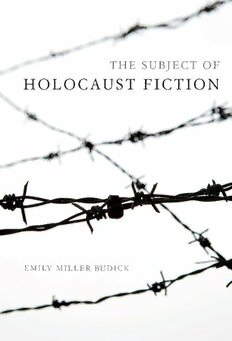
The Subject of Holocaust Fiction PDF
Preview The Subject of Holocaust Fiction
THE SUBJECT OF HOLOCAUST FICTION JEWISH LITERATURE AND CULTURE Alvin H. Rosenfeld, editor THE SUBJECT OF HOLOCAUST FICTION Emily Miller Budick Indiana University Press Bloomington & Indianapolis This book is a publication of Indiana University Press Office of Scholarly Publishing Herman B Wells Library 350 1320 East 10th Street Bloomington, Indiana 47405 USA iupress.indiana.edu © 2015 by Emily Miller Budick All rights reserved No part of this book may be reproduced or utilized in any form or by any means, electronic or mechanical, including photocopying and recording, or by any information storage and retrieval system, without permission in writing from the publisher. The Association of American University Presses’ Resolution on Permissions constitutes the only exception to this prohibition. The paper used in this publication meets the minimum requirements of the American National Standard for Information Sciences— Permanence of Paper for Printed Library Materials, ANSI Z39.48–1992. Manufactured in the United States of America Library of Congress Cataloging-in-Publication Data Budick, E. Miller, author. The subject of Holocaust fiction / Emily Miller Budick. pages cm. — (Jewish literature and culture) Includes bibliographical references and index. ISBN 978-0-253-01630-0 (pb : alk. paper) — ISBN 978-0- 253-01626-3 (cl : alk. paper) — ISBN 978-0-253-01632-4 (eb) 1. Holocaust, Jewish (1939–1945), in literature. I. Title. PN56.H55B83 2015+ 809.3'9358405318—dc23 2014041962 1 2 3 4 5 20 19 18 17 16 15 For Hananel, Micha, Amos, and Noga Almakies Tzeelah, Avital, and Carmel Sharon You are the joys of your grandparents’ lives. May you each grow into the person you wish to become; may you continue to include your grandparents in your lives; and may you always be mindful not only of the sadness and tragedies of the Jewish past but also of its triumphs. This book is also dedicated to the memory of our son Yochanan Budick who, had he lived, would certainly have been, like his siblings, nieces, and nephews, a vibrant contributor to the life of the people he so loved. This page intentionally left blank Contents Acknowledgments ix Introduction 1 P rologue: Ghostwriting the Holocaust: The Ghost Writer, The Diary, The Kindly Ones, and Me 19 Section i. Psychoanalytic Listening and Fictions of the Holocaust 1 V oyeurism, Complicated Mourning, and the Fetish: Cynthia Ozick’s The Shawl 41 2 Forced Confessions: Subject Position, Framing, and the “Art” of Spiegelman’s Maus 70 3 Aryeh Lev Stollman’s The Far Euphrates: Re-Picturing the Pre-Memory Moment 100 Section ii. Golems, Ghosts, Idols, and Messiahs: Complicated Mourning and the Intertextual Construction of a Jewish Symptom 4 Bruno Schulz, the Messiah, and Ghost/writing the Past 127 5 A Jewish History of Blocked Mourning and Love 146 6 See Under: Mourning 163 Section iii. Mourning Becomes the Nations: Styron, Schlink, Sebald 7 Blacks, Jews, and Southerners in William Styron’s Sophie’s Choice 185 8 ( Re)Reading the Holocaust from a German Point of View: Bernhard Schlink’s The Reader 195 viii | Contents 9 Mourning and Melancholia in W. G. Sebald’s Austerlitz 209 Epilogue: Holocaust, Apartheid, and the Slaughter of Animals: J. M. Coetzee’s Elizabeth Costello and Cora Diamond’s “Difficulty of Reality” 228 Bibliography 239 Index 247 Acknowledgments T hiS book haS been a long time in the writing. Many of the debts I have amassed are now so woven into the fabric of my being, let alone into the book itself, that I can no longer pick them apart. Therefore, to all my friends and fam- ily, colleagues and students, with whom I’ve entered into conversation on this subject, I am thankful for the enlightenment and illumination I have received. You know who you are. Some debts are easier to retrieve, such as the journals and collections that have not only given me permission to reprint from the materials that went into writing this book but also helped to shape that material in the first place. There- fore, I want to thank the journal Common Knowledge, which first printed an early version of the Ghost Writer arguments as “The Haunted House of Fiction: Ghost- writing the Holocaust,” Common Knowledge 5 (1996): 120–35, and Prooftexts, which published “Forced Confessions: History, Psychoanalysis, and the ‘Art’ of Holocaust Fiction; The Case of Art Spiegelman’s Maus,” Prooftexts 21 (2002): 379– 98. My gratitude also goes to Marc Lee Raphael, whose two conferences resulted in “Psychoanalysis, Epistemology, and Holocaust Fiction: The Case of Cynthia Ozick’s The Shawl,” in The Representation of the Holocaust in Literature and Film, ed. Marc Lee Raphael (Williamsburg, VA: College of William and Mary, 2003), 1:1–28, and “The Holocaust, Trauma, and the Jewish Fiction of Tzimtzum: Aryeh Lev Stollman’s Far Euphrates,” in The Representation of the Holocaust in Litera- ture and Film, ed. Marc Lee Raphael (Williamsburg, VA: College of William and Mary, 2007), 2:24–39. Many of the materials that constitute section 2 of the book first appeared in an essay titled “Survivor Guilt and Incomplete Mourning: The Symptoms of a Jewish Literary Canon,” in Arguing the Modern Jewish Canon: Essays on Literature and Culture in Honor of Ruth. R. Wisse, ed. Justin Cammy, Dara Horn, Alyssa Quint, and Rachel Rubinstein (Cambridge, MA: Harvard University Press, 2008), 517–31. From February 2012 to November 2012 I was a fellow at the Center for Ad- vanced Holocaust Studies, United States Holocaust Memorial Museum, in Wash- ington, D.C. I am grateful to the museum staff and to Phyllis Greenberg Heide- man and Richard D. Heideman, who provided the fellowship that paid for my stay there. I am especially thankful to Rami Aronzon, with whom I coauthored the book that was my introduction into the field of the unconscious mind: Psycho- therapy and the Everyday Life. Even though this was a practical book rather than a scholarly book, it provided me with the background in Freud’s theories of ix
